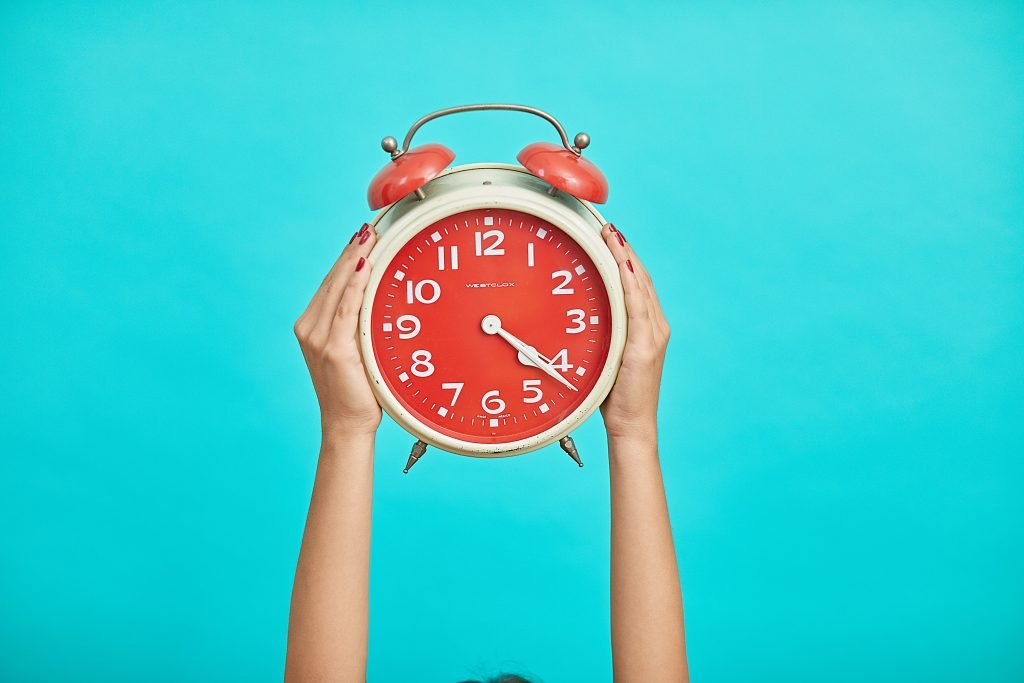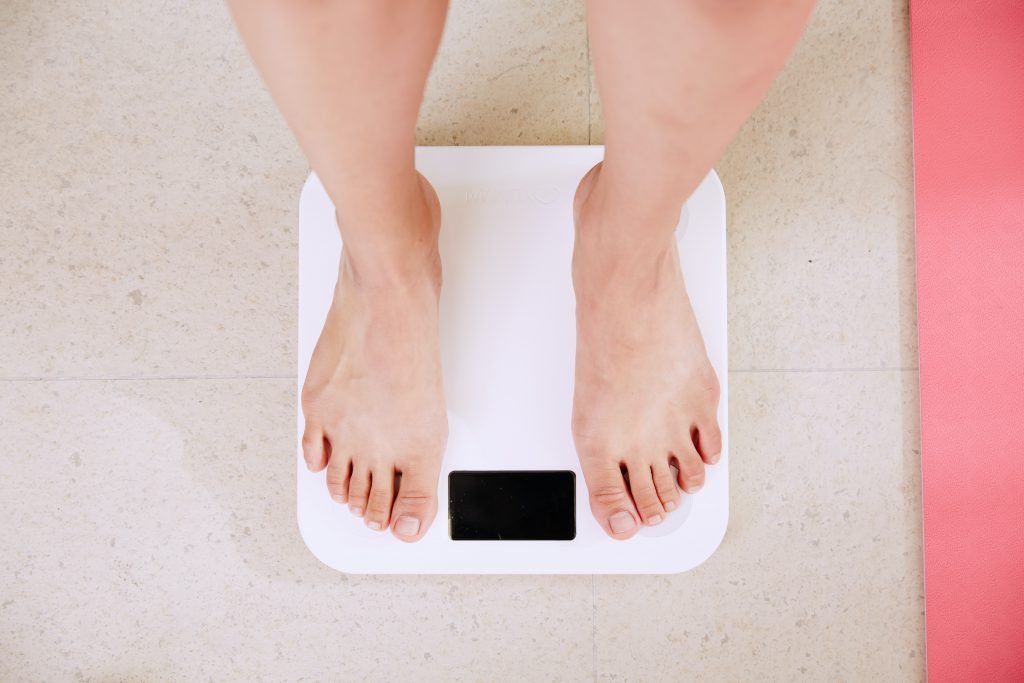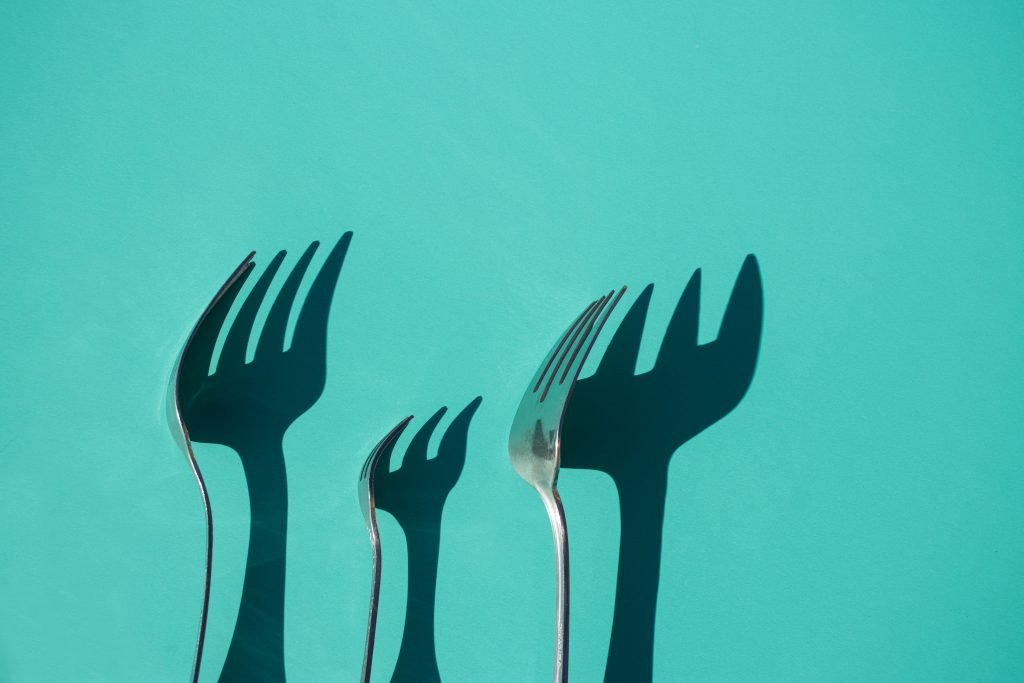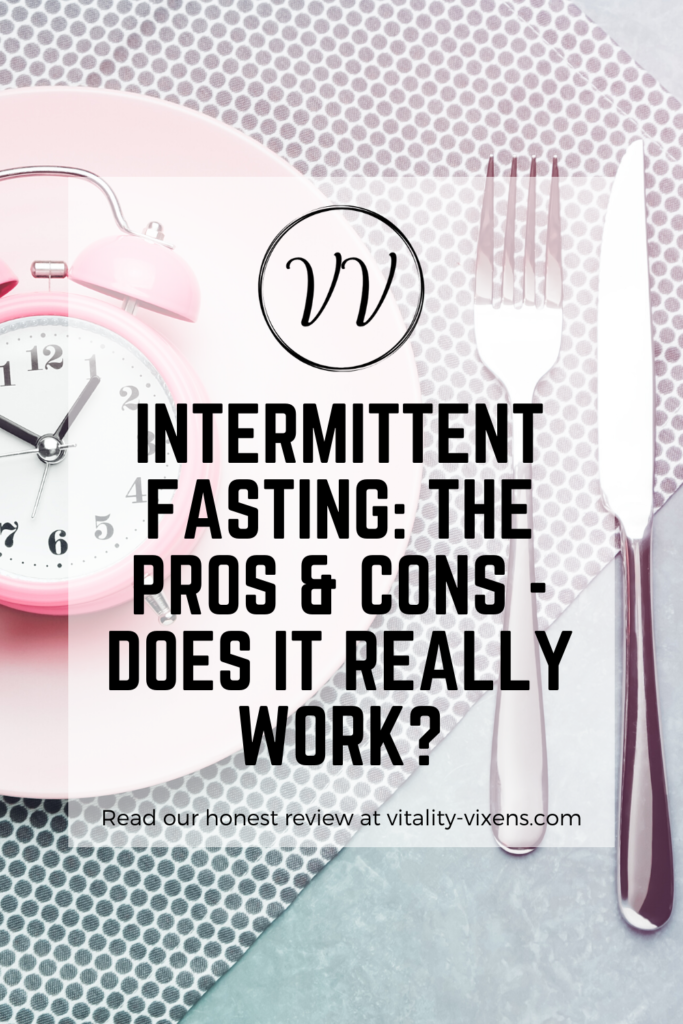Intermittent fasting seems to be all the rage these days. I’ve read articles about all the celebrities doing I.F., experiencing mental clarity, weight loss, increased focus, etc. But I was skeptical of how a seemingly “fad diet” could have all these crazy benefits, so I had to try it myself!

My Experience with Intermittent Fasting
I started out by doing the 16:8 version of intermittent fasting. This is where you fast for 16 hours then eat during an 8-hour window. I’ve always been a big breakfast person, so skipping breakfast seemed almost impossible to me at first.
It turns out, skipping breakfast wasn’t the hard part of IF. I actually felt really focused and energized in the mornings, once I got used to the diet. Even when I wasn’t eating breakfast at my normal time, which I thought would cause me to feel sluggish and tired.
Surprisingly, the early mornings before eating my first meal ended up being the best part of the day. I had a clear head and was able to bang out some homework in a couple of hours. To my surprise, I wasn’t thinking about food at all (at this point).
The tough part ended up being at night after my eating window was over & I was back in the fasting portion. I was trying to eat from 11 AM-7 PM, so by 10/11 PM, I would almost always feel hangry.
After about a week of this, I would end up binge eating at my last meal of the day. Since I knew I was about to go for 16 hours without eating, I felt like I had to load up on calories to get me through the fasting window. Obviously, that ended up being a hot mess, but more on that later…
What Went Well for Me
During my time intermittent fasting (slightly over a month), I figured out a few ways to make it more effective. First of all, coffee was essential in the mornings to help me stay even more focused & alert.
In IF, you’re not allowed to have cream or sugar in your coffee during your fasting window. This can mess up your fast and lower the benefits you experience. But for me, drinking black coffee every day can get boring…
I’ve heard a number of things you can add to your coffee while on the IF diet. What you add is all about personal preference. My favorite was adding coconut oil to my coffee in the mornings!
Coconut oil gave the coffee a more creamy taste, without adding actual cream or sugar. It also added a coconut flavor, of course, which I love! I normally drink my iced coffee recipe (with Nut Pods), which has a hint of coconut.
I still drank my regular iced coffee during my eating window, but I didn’t want to have the carbs in my fasting window. Even if it is sugar-free!
Another type of coffee I’ve heard rave reviews from friends about is Bulletproof Coffee. My friends who have started their IF journey (some are much farther along than I got), swear by this coffee.
You can buy Bulletproof Coffee as ground coffee or Keurig pods.
To make your coffee the keto-friendly “Bulletproof way”, you will add in MCT oil and Grass-Fed Ghee. It’s up to you what your preference is and what to add to your coffee.
Drinking Bulletproof coffee during IF can help curb cravings, burn fat, and keep you focused. You can read more about the benefits of combining Bulletproof coffee with intermittent fasting here.

Types of Intermittent Fasting
There are a few different versions of IF, including the 16:8 version that I tried. You can switch up the times and make it pretty customized to your schedule and preferences.
You can do a 14:10 version if you want a slightly shorter fasting window and longer eating window. I ended up doing this version some days when I was way too hungry to skip breakfast.
There’s also an 18:6 or even 20:4 version for people who want to make the fasting window even longer. I don’t think I could personally only eat for 4 hours a day, but to each their own!
Another different version of IF is the 5:2 method. In this method, you eat normally 5 days a week. Then on the other 2 days, you only consume 500-600 calories throughout the day (1).
All these methods, if done right, can lead to weight loss and other benefits. But they can be very challenging diets and don’t work for everyone (including me).
The Pros & Cons of Intermittent Fasting
Every diet has its pros & cons and intermittent fasting is no different. Especially with this diet, the positives vs. negatives you’ll experience are very subjective. They can vary heavily from person to person and it’s important to listen to your body and determine how it affects you.
The Benefits
I’m not going to lie, some of the benefits that are hyped up about IF are 100% true. I experienced more mental clarity, focus, and energy in the mornings than I ever had by eating normally. And if this benefit lasted throughout the day (like it does for some people), I would never want to stop with IF!
For me, sadly, that benefit was only in the mornings before I’d eaten my first meal. But I’ve heard stories from people who have done IF for longer, who say they feel that way more often (compared to my experience).
Intermittent fasting is also shown to have a number of benefits, including:
1. Inflammation reduction (1)
2. Reduction of LDL “bad” cholesterol, blood sugar, and insulin resistance; All aiding in heart health (1)
3. Aids in the growth of new nerve cells, which helps with brain health (and potentially protects against Alzheimers’s) (1)
4. Anti-aging properties (1)
It’s important to note that most of the research is still very new. Much of the research was done in animal studies, so there is still little scientific evidence of these benefits on humans (1).
Does Intermittent Fasting Help With Weight Loss?

I didn’t personally try intermittent fasting to lose weight. I tried it because I wanted to see if there were really benefits in my focus and energy levels.
For people who do use IF to lose weight, it might work, but it might not. The main reason people lose weight on this diet is because of the reduced calorie intake. If you’re only eating 8 hours a day, as opposed to 14-16 hours, you’re likely to consume less food overall.
If you really stick to the diet and are only eating when you’re hungry during your eating window, you’re likely to lose weight. The problem is when you end up overeating during your last meal to try and “store up energy” for the fasting period. This is what happened to me, even though I wasn’t trying to lose weight in the first place.
There are a couple of reasons other than reduced caloric intake that IF can help with weight loss. IF can increase your metabolic rate due to changes in hormones. It increases the release of norepinephrine, which is a fat-burning hormone (1).
Studies have also shown that intermittent fasting does not cause as much muscle loss compared to other diets. This is a huge benefit if you’re trying to lose weight because you’re losing more fat as opposed to muscle (1).
But Isn’t Skipping Breakfast Bad For Your Health?
Honestly, that was the scariest part for me at the beginning of this IF journey. I’d heard throughout my entire life that eating breakfast was the most important part of starting your day. I thought if you skipped breakfast, your metabolism and energy would be shot.
I don’t have a 100% certain answer for whether or not skipping breakfast is bad for you. For me, it wasn’t.
I was worried that I would start gaining weight or feeling starving in the mornings. But that didn’t happen. I actually ended up feeling great in the mornings before breakfast and had the most energy & focus then.
What I had been told throughout my life about gaining weight and slowing down your metabolism without breakfast didn’t seem to happen. I stayed at a steady weight throughout this experience and saw no change in muscle/fat ratio.
Although I’m not doing IF anymore, this is actually the part that stuck with me. I don’t feel like I have to force myself to eat breakfast first thing in the morning anymore “for my health”. If I’m not hungry when I wake up, I don’t eat my first meal until I actually feel hungry.
This has been an incredible change for me because I used to force myself to eat breakfast every morning, even when I wasn’t hungry. Now that I’ve realized I don’t have to do that and nothing will change, it’s easier to stick to my hunger/fullness cues.
Hunger & Fullness Cues’ Relation to Intuitive Eating
This is a huge part of intuitive eating and has pushed me along even further into my intuitive eating journey. If you want to learn more about intuitive eating, I always recommend this book because it’s written by RD’s and is science-based.
As far as eating breakfast goes, it’s a completely individual thing. I know people who never eat breakfast and are perfectly healthy. I also know people who constantly skip breakfast and are very unhealthy.
It all comes down to what you’re eating throughout your day. It doesn’t really matter what time you’re eating your meals. It’s important that you’re generally fueling your body with nutritious foods when you do eat.
If you’re going to skip breakfast or wait til you’re hungry to eat, it’s important that you’re fueling your body during your first meal. I wouldn’t wait til 11 AM to eat breakfast to just eat a granola bar… You should try to make your first meal when you “break your fast” a big, healthy meal.
I love eating eggs, a couple pieces of wheat toast (with avocado or nut butter), and some sort of fruit. This breakfast keeps me energized and full throughout the day, no matter what time I eat it! If all I have is a granola bar or a piece of fruit, I will feel hangry and sluggish an hour later.
The Downside of Intermittent Fasting
Intermittent fasting, like most other diets, can be hard to stick with. In a study conducted at Harvard, 38% of participants dropped out (2). This is reflective of real-life because IF can be a hard regimen to keep up with long term.
When you’re intermittent fasting, the hunger & appetite hormones in your brain go into overdrive (2). Your body thinks it’s starving during the fasting period and feels afraid that you may not eat again. This can cause binge eating during your eating window because your body wants to store up energy (calories) for the next “starvation” period.
Studies on IF in humans are still few and far between. Most of the research done has been conducted in animal studies. As far as the benefits listed above, it’s hard to determine if they’re from IF specifically, or just from general weight loss (2).
Isn’t Intermittent Fasting Just Another Diet?

IF is a diet that has definitely been proven to work for people trying to lose weight. While I’m usually strongly against diets, this one feels different to me because you’re not restricting any certain food group. You’re allowed to eat whatever you want, you’re simply restricting when you eat.
Personally, even restricting the time frame I was eating was too much restriction. It caused me to feel crazy around food like I did in my dieting/food restriction days. IF still felt like too much of a diet to me and I would personally rather focus on intuitive eating.
(If you’re interested in learning more about intuitive eating and a non-diet mentality, these books are amazing resources! Intuitive Eating: A Revolutionary Program That Works & The F*** It Diet.)
But for others who IF has worked for, it obviously does not feel as restrictive as other fad diets. Or at least the level of restriction is doable long term.
Try It for a Month

I would recommend people try intermittent fasting for themselves for a month. This way you can see how it works for you! If it doesn’t work, it’s not the end of the world, and you know there are a lot of people that it has also not worked for.
If it does work, then that’s great! I’ve heard a lot of success stories, so I know that it’s possible.
Remember, intermittent fasting is not for everyone! You should consult with a doctor before trying any new diet. If you have diabetes or take medicine for heart disease or blood pressure, you should not attempt an IF diet.
If you’ve ever struggled with any sort of eating disorder or disordered eating, I would not recommend this diet. Like I said for myself personally, and for many others, IF still feels too restrictive. Even though you’re not restricting any certain food group, it can still trigger those parts of your brain that struggled with restrictive eating in the past.
I’ve been eating normally (intuitive eating) for years now and this diet still triggered me in ways I wasn’t expecting. It led me back to my disordered eating days and trying to have too much control over my diet. This didn’t feel good for me at all and that’s why I won’t personally try this diet again.
I Hope This Was Helpful!
If you guys have any questions regarding my experience with intermittent fasting, please don’t hesitate to comment below with them! I hope this honest review was informative and helpful to those considering trying IF. Please remember to consult with your doctor/nutritionist before attempting any new diet.
If you liked this article and want to save it for later, feel free to save the Pin below. 🙂

Comment below with:
1. Have you tried intermittent fasting before?
2. What benefit(s) of IF draw you to the diet?
3. What scares you about starting intermittent fasting?
Disclosure: This post contains affiliate links. If you make a purchase through an affiliate link, we will earn a commission at no extra cost to you. This allows us to continue running our site & providing free content to our readers. Read our full disclosure here. Thank you for your support!







This is definitely interesting to know, i’ve tried to read up on intermittent fasting before and just struggled to find the information but this really helps!
Janay,
I’m glad this was helpful for you! Thanks for reading ☺️
Erin
Thanks for sharing your experience! I end up doing 16:8 a lot of days by accident because that’s just when I’m hungry. You’re totally right about getting hungry at night though. The 10 pm hanger is real 😂 great post!
Julianne,
I’m glad to know someone else is in the same boat with me! Lmao. The hanger is real! 🙂
Erin
Intermittent fasting isn’t for everyone. I have done it. For me, I find smaller more frequent meals of under 500 calories much easier to do. I lost 90 pounds this way. But there is some science behind intermittent fasting and disease management, such as diabetes, liver, heart diseases and cancer. If you can sustain this type of eating behavior, all the power to you!
Patricia,
I completely agree with you that it isn’t for everyone by any means! That is awesome to hear that you lost 90 pounds by just eating smaller frequent meals! That’s typically what I end up doing too most days. 🙂
Erin
Tysm for this blog!!! Really needed it!
Thank you for reading! 🙂
I already do intermittent fasting, it helps a lot.
Ryan,
That’s awesome to hear that intermittent fasting works for you! 🙂
Erin